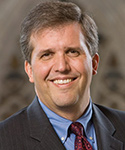“How would writing your book ‘Embodying Forgiveness’ affect the way you would lead us as dean?” I thought I had prepared for all of the questions the Duke Divinity School search committee would ask me in those early days of 1997. But I had not anticipated questions about connecting my scholarship to my leadership. I offered the best answer I could muster: “Well, I do have a chapter in the book on 'Loving Enemies.'"
Over the years, I have come to believe that my response was more than a clever retort. The Chinese general Sun Tzu, writing in the 5th century BCE, famously advised leaders to “keep your friends close, and your enemies closer.” But our call as Christian leaders is more than that. We are called to a ministry of reconciliation, of bearing witness to God’s reign in a broken world.
Abraham Lincoln, as portrayed in Doris Kearns Goodwin’s “Team of Rivals,” offers an example of what such a practice might look like. He is remembered for saying, in the face of criticism for uttering kind words about the South, “Don’t I destroy my enemies if I make them my friends?”
In our own time, I have been drawn to the witness of Nelson Mandela’s moral leadership, brilliantly described by John Carlin in his recent book “Playing the Enemy.” To be sure, Mandela understood the tactical significance of keeping your enemies close. While in prison, he learned Afrikaans, the language of his jailers and of the government that had unjustly imprisoned him. When he became president, he recognized that promoting sport would further his goals of reconciliation and healing. And so he used sporting events -- especially rugby, the favored sport of the Afrikaner and, thus, a symbol of oppression to black South Africans -- as an opportunity to win over people who had been his political enemies.
At the same time, however, Mandela also loved his enemies in a deeper way. Carlin describes Mandela’s stubborn love of others, even the most hardened Afrikaner administrators of apartheid, by evoking the language of “better angels” from Lincoln’s First Inaugural: “Yet Mandela zeroed in on that hidden kernel where their better angels lurked and drew out the goodness that is inside all people.”
As a result of these deep commitments developed through years of patient and challenging practice, Carlin concludes that “the political mask became his real face; Mandela the man and Mandela the politician became one and the same.” That became symbolically and dramatically visible when President Mandela donned a jersey of the national rugby team, the Springboks, and went out on the field before the World Cup Rugby Final in 1995 in Johannesburg. He not only scored a tremendous political victory; he became a sign of national reconciliation himself.
The stories of Lincoln and Mandela set a moral compass for our aspirations, ennobling us to recognize that the people in our institutions, the people with whom we work and are in ministry, all have “better angels” to which we can appeal -- even if, or perhaps especially if, they are opposed to decisions we make. Even if they oppose our very leadership.
We are most likely to lead our institutions, and our people, in service of our end, our telos -- thriving communities that are signs, foretastes and instruments of the reign of God -- insofar as we are able to create institutions that are themselves thriving communities. This means creating space for diverse voices to be heard, including our enemies, even if the act of leadership does not allow for every member of an organization to support every decision.
To be sure, when faced with serious antagonists, it is tempting to demonize or dismiss them. When so tempted, I return to the example of Mandela, who once was taunted for a full three minutes on the radio by an unrepentant and antagonistic Afrikaner, a public figure involved in planning violence during the transition to a new government. After the Afrikaner had finished, there was a tense pause. Mandela then replied: “Well, Eddie, I regard you as a worthy South African, and I have no doubt that if we were to sit down and exchange views I will come closer to you and you will come closer to me. Let’s talk, Eddie.”
Eddie didn’t know how to respond, other than to say, “Uh…right, okay, Mr. Mandela. Thank you.” And then he hung up.
It takes courage not to demonize or dismiss, but to learn to love deeply one’s enemies and practice reconciliation. “Let’s talk” is a worthy place to begin.















